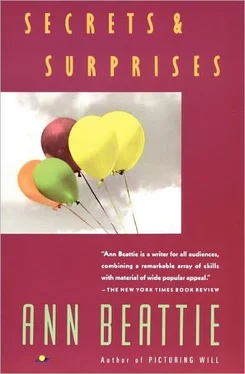Elena had lived with Tom in his brother’s high rise on the East Side of Manhattan, but when Tom’s brother came back from Europe they had to leave the borrowed apartment, and Tom suggested that it might be a good idea if they lived apart for a while. It had not come as a surprise to Elena, but Tom’s dates with Margaret had.
Margaret had never lived with Tom; she had dated him when she was going to nursing school, telling Elena that she knew living with a man would be a great distraction from her work, and once she had decided what she wanted to do, she wanted to concentrate hard. It hurt Elena that Tom would prefer Margaret’s company to her own, and it hurt her more that Margaret did not seem to really love him — she preferred her work to him. But Margaret had always been the lucky one.
Tom visited every year, around Christmas. The first year he came he talked about a woman he was dating: a college professor, a minor poet. If the news hurt either of them, the sisters didn’t show it. But the next year — they were surprised that he would come again, since the first year he came his visit seemed more or less perfunctory — he talked to Elena after Margaret had gone to bed. He told her then that it had been a mistake to say that they should live apart, that he had found no one else, and would find no one else: he loved her. Then he went into her bedroom and got into bed. She thought about telling him to get out, that she didn’t want to start anything again and that it would be embarrassing with Margaret in the next bedroom. But she counted back and realized that she had not slept with anyone in almost a year. She went to bed with him. After that visit, a sentence in one of his letters might have been meant as a proposal, but Elena did not allude to that in her letter to him, and Tom said nothing more. Finally his letters became less impassioned. The letters stopped entirely for almost six months, but then he wrote again, and asked if he could come for what he called his “annual visit.” He also wrote Margaret, and Margaret said to Elena, “Tom wants to visit. That’s all right with you, isn’t it?” They were standing in the doorway to the kitchen, where Elena was putting down a saucer of milk for the cat.
“What are you thinking about so seriously?” Margaret said.
“We need a new kettle,” Elena said. “One that doesn’t whistle.” She lifted the kettle off the burner.
“Is that what you were really thinking about? I thought you might have been thinking about the visit.”
“What would I be thinking? I don’t care if he comes or not.”
“I don’t either. Maybe next year we should just say no. It does sort of stir up memories.”
Margaret poured water into a cup and added instant coffee and milk. She put the kettle down and Elena picked it up. It irritated Elena that Margaret always added the coffee after she had put the water in. It also irritated her that she had time to be bothered by such things. She thought that as she got older, she was becoming more and more petty. She had a grant, this year, to write about Rousseau’s paintings, and she kept bogging down in details. After a few hours’ work she would be bored and leave the house. Sometimes she would see no one but Margaret from week to week, except for the regulars at the village store and an occasional hunter walking through the woods, or along the roads. In the summer she had dated an older man named Peter Virrell, one of the summer people who had stayed on, but they had very little to say to each other. He was a painter, so they could talk about art, but she got tired of researching and writing and then talking all night about the same subject, and he drank more than she liked and embarrassed her the next day by calling and begging forgiveness. She found excuses not to see him. Once, when she did, he drank too much and insisted on holding her when she didn’t want to be held, and with his lips softly against her ear whispered, “Stop pretending, stop pretending …” She had been afraid that when he stopped whispering, he was going to strike her. He looked angry when he let go of her and stood there staring. “Pretending what?” she said, trying to keep her voice even. “You’re the one who knows,” he said. He sat in front of his open fireplace, tossing in bits of paper that he had shredded and worked into little balls.
“I don’t have to explain myself to you,” she said.
“I’m forty years old and I drink too much,” he said. “I don’t blame you for not being interested in me. You don’t intend to sleep with me, do you?”
She had not been asked that so bluntly since college, when a few crazy boys she knew talked that way. She didn’t know whether to resent it or to try to answer him.
“That’s what I thought,” he said. “Next do you say that you want to go home, and do I drive you?”
“You’re trying to make me a puppet,” she said. “You’re making a mockery of me before I even speak.”
“I’m sorry,” he said. He got up and put his coat on, and she heard his keys jingle as he lifted them from the table. She was humiliated to be sent home, like a child being sent from the room after it has cutely performed for all the guests. She continued to stand by the fire, but he continued to stand in the hallway.
“I didn’t know you were dating me for sex,” she heard herself say.
“I wasn’t,” he said.
That was in August, and she had not seen him since. Sometimes when she was depressed she would think of Peter and wonder whether she shouldn’t have tried harder so that she and Margaret wouldn’t end up together forever. They seemed to Elena to be old people already, the way they carried on about the cat: how clever it was, how much personality it had.
Tom came at eight o’clock, as Elena and Margaret were finishing dinner. Tom’s hair had grown long. He wore a black coat and black boots. He had a friend with him, a fellow named Max, who stood by shyly. Max was taller than Tom, and nowhere near as good-looking. He had on a denim jacket with layers of sweaters underneath, and his face was mottled pink from the cold. Tom brought him forward and introduced him. Tom presented his usual assortment of odd gifts: a basil plant, ajar of macadamia nuts, a book of poetry called Gathering the Bones Together , a poster of Donald O’Connor and Debbie Reynolds and Gene Kelly from Singin’ in the Rain . After the admiring, and the laughing, and Margaret adopting Debbie Reynold’s posture and expression, no one seemed to know what to say. Margaret offered to show Max the house. Elena told Tom how much he had changed. She didn’t think that she would have recognized him on the street. When they lived together he had been thin, with a beard and short hair. Now, she saw, as he took off the coat, he had put on weight. His hair was as long as hers.
“Would you like a drink or a cup of coffee?” Elena said.
“Where have Margaret and Max gone?” Tom said.
They were silent, and could hear talking in the far room, the room where Margaret grew plants under lights in the winter.
“I might have a beer,” he said. “There are some in that bag Max carried in.”
They bent together to pick up the bag. Their heads bumped. She thought, again, that this was going to be an impossible visit.
“Have one?” he said.
“No thank you.”
“Okay if I get a fire going? You’re the only person I know who’s got a fireplace.”
He went to the fireplace and crumpled newspaper and stuffed it in and began building a pile of kindling and logs. Elena sat on the floor, holding the box of matches. She thought back to the night in August when she had last seen Peter.
“You said you were writing about Rousseau,” Tom said. “How’s it coming?”
“Not very well. I think I might have chosen the wrong topic.”
Читать дальше












